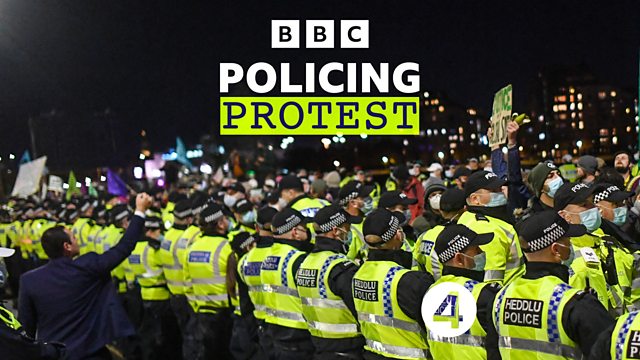Political Space
With protest on the rise and the sheer diversity of groups, tactics and causes Mark Easton explores the policing of protest in the UK from Peterloo to the present - and beyond.
The story of policing is bound up with the history of protest. Far more than dealing with demonstrations on the street, policing owes its very existence to fears of political unrest and to help protect the state from public disorder. In this wide-ranging three-part series, �������� �������� Affairs Editor Mark Easton, with the help of former Police Assistant Commissioner Rob Beckley, tells the story of policing protest in the UK from Peterloo to the present - and beyond.
Episode 3: Political Space
Protest needs public space. In this episode Mark looks at the issue of demonstration and the quiet erosion of such space, as our shared urban areas fall increasingly under private and corporate control: is the reality of the public square, the space of protest, in danger? But protest and the police response doesn’t just happen in the physical space – increasingly it happens in the virtual too. With powerful new technology at their disposal the police conduct surveillance and intelligence operations on protest groups of all types. But in the wake of the ‘spy cops’ scandal what are the limits of this kind of activity? And as protest tactics by groups like Just Stop Oil and the new climate activists Shut the System become more disruptive, more radical, who decides which groups are considered ‘extremist’ and proscribed as such?
Modern policing in Britain has its origins in protest. The Metropolitan Police was founded by Robert Peel in 1829 in the shadow of the Peterloo massacre ten years earlier where, under instruction from the government, local militia fired directly into the crowd gathered in Manchester in support of voting rights for working men. Peel devised the notion of ‘policing by consent’ as a way of securing support for police within communities, as opposed to using coercive force from without. So simultaneously a police force, an arm of the state tasked with controlling public order and crowd control, that would also be a community service - sensitive and responsive to citizens. This tension lies at the heart of policing even today and is part of a deeper story of how society contains and manages dissent.
Today, policing protest and the control of public order remain at the heart of modern policing. Every week in the capital and cities around the UK the sheer scale, diversity and number of protests is increasing - from domestic issues to climate change and international affairs, with large protests on events in the Middle East. There are huge variations in tactics and the use of social media by different groups – from marching and procession to occupation and ‘static’ protest, direct action and disinformation. And all of this requires policing.
In an era of what police are calling ‘chronic’ protest, resources are being stretched to breaking point. Live social media means the police are under more scrutiny and pressure than ever. Organisations like Extinction Rebellion have brought the capital to a standstill while other groups, like Black Lives Matter, have targeted policing itself as an object of protest.
Hearing from police officers of all ranks, activists and agitators from across the protest spectrum, historians, political thinkers, lawyers and journalists – and rich with archive - this series goes deep into the philosophical foundations and real tactics of public order policing. It explores the future of AI in policing protest and new technologies deployed by protestors, the police’s use of crowd psychology, the testing of ‘operational independence’ in the face of political pressure and the regulation of what spaces may or may not be used for public dissent today – the erosion of the protest space, reclaiming our political commons.
Where does the future of protest lie - and with new powers at their disposal, how will it be policed?
Contributors include Lyse Ducet, �������� Chief International Correspondent; Police Sergeant Harriet Blenman; Chief Constable Chris Noble; public order Bronze Commander Jack May-Robinson; historian Katrina Navikas; Graham Smith, CEO of Republic; author Anna Minton; journalist Danny Penman; Rick Muir, director of the Police Foundation; author and police strategy advisor Tom Gash; XR liaison and former police officer Paul Stephens; climate activist Dan Hooper, aka ‘Swampy’; Miriam, activist with Shut the System; author Dan Hancox; human rights barrister Michael Mansfield KC; government advisor on ‘Political Violence and Disruption’ John Woodcock aka Lord Walney; David Mead, professor of human rights and public order law at UEA and former Labour �������� Secretary, Lord David Blunkett.
Presented by Mark Easton, with reporting by Rob Beckley
Reading by Zachary Nachbar Seckel
Produced by Simon Hollis
A Brook Lapping production for �������� Radio 4
Last on
Broadcasts
- Mon 5 Aug 2024 11:00�������� Radio 4
- Sunday 17:10�������� Radio 4

